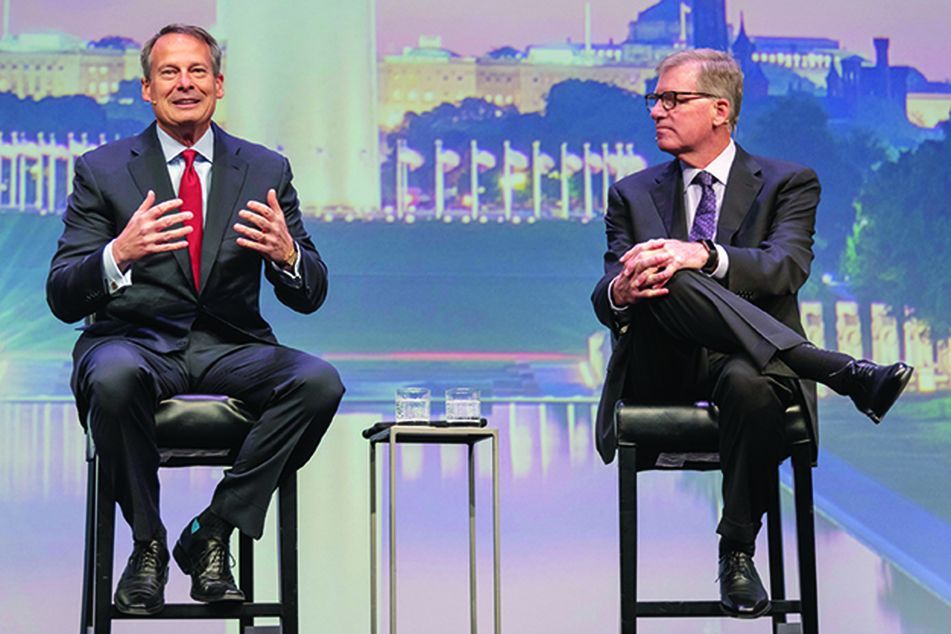The view from IMPACT: Where the industry is headed

Learn why technology, scale and talent are three themes that will dominate the future of the advisory business, and why it's important to touch on the past before looking ahead.
https://www.investmentnews.com/wp-content/uploads/assets/graphics src=”/wp-content/uploads2018/12/CI118189126.JPG”
Technology, scale and talent are three themes that will dominate the future of the advisory business, according to Bernie Clark, executive vice president and head of Schwab Advisor Services. But in his keynote remarks kicking off his firm’s recent IMPACT conference in Washington — the largest ever, with 5,000 attendees — Mr. Clark touched on the past before looking ahead.
Mr. Clark noted the fearful mood of attendees — and the nation — a decade ago, in the wake of the global financial crisis.
“When clients didn’t know what to do, you provided a path,” he told the 2,200 advisors gathered for the opening session in Washington. “You not only saw clients through some of the scariest financial times in this country’s recent history, you were a refuge when trust was broken.”
For its commitment to putting the customer first, the RIA model has earned investors’ confidence, Mr. Clark observed.
“Registered investment advisors now constitute a $5 trillion business, a tripling of assets over the last decade, and we see no signs of that growth abating,” he said.
Taking questions from the audience after prepared remarks, he and Walt Bettinger, president and CEO of The Charles Schwab Corp., dove into their views of the future of the business and Schwab’s plans in light of those trends.
Technology will play an increasingly important role in the advice business, the executives noted, not as a replacement for the advisory relationship, but as a way to enhance the customer experience, increase efficiency and facilitate growth. Technology is also essential to helping advisors scale their business, which is becoming imperative as margin pressure continues, largely due to advisors’ being called upon to provide a wider range of services for the same, or lower, fees.
“From our own experience, we know that advisors will increasingly rely on technology to support the business,” Mr. Clark said. “And you, too, will need to scale. The experience of the future will be one of relationships augmented by technologies that will come.”
A report on robo advice released by Schwab a day after the IMPACT conference confirms that view. It found that 58% of a national sample of adults surveyed expect to use a robo advisor by 2025, but 71% want a robo advisor that also provides access to human advice — a figure that rises to 80% among millennials.
Concurrent with technological changes, Mr. Clark pointed to the need to find new talent to meet changing client expectations, as well as to replace members of the current aging advisor population. Seeking out, training and mentoring a younger and more diverse workforce (see story page S8) will be an ongoing necessity for advisory firms, Mr. Clark noted.
To support the distinctive RIA business model and the regulatory environment that has made the industry’s growth possible, Schwab will continue to make policy advocacy a priority, said Mr. Bettinger.
“If there are times we make decisions that appear not to support your growth efforts as much as you might like, understand that behind it is our work aimed at avoiding having the industry operate in a rules-based world,” he said.
Commenting on the registered investment advisory firm model, Tim Oden, a national managing director at Schwab Advisor Services, said that more and more advisors — and especially those working as part of large teams at traditional service providers — are coming to see its advantages.
“We see the momentum continuing for large, complex teams to break away and become independent RIA firms,” he said. “The ecosystem that supports the RIA business has become more complex and more supportive. And at the same time, end-clients are asking for services that the teams struggle to provide in their current environment. As a result, many more of these larger teams are being both pulled and pushed into independence.”
Another reason Mr. Oden sees more advisors making the switch is that the RIA model provides the freedom and ability for advisors to establish their own distinctive online identity and a unique social and digital presence.
“Advisors thinking about podcasts, new media and other ways to get their message out see the advantage of independence,” he said.
Touching on how RIAs view themselves differently from other advisors, Mr. Clark pointed to the findings of Schwab’s latest Independent Advisor Outlook Study (IAOS), which found that when compared with wirehouse advisors, 95% of the RIAs surveyed feel they are differentiated when it comes to acting in a client’s best interest, understanding a client’s specific needs (84%) and understanding and supporting a client’s entire financial life (83%).
As RIA firms look to the future, he noted that the IAOS found that advisors are turning to next-generation advisors for insights on the use of technology and changes in marketing and firm culture. In terms of the coming investment environment, the study found that most advisors (70%) expect the S&P 500 to continue to go up during the next six months, although 71% of advisors are somewhat or very concerned about the possibility of a downturn, as are 82% of clients.
Liz Ann Sonders, Schwab’s chief investment strategist, told IMPACT that she is being cautious in her outlook, based on some hard-data weaknesses in areas including industrial production and retail sales.
“Soft data like business cycle indicators and confidence-sentiment surveys have been strong, and these tend to have a higher correlation to the stock market,” she said. But she believes the divergence is more likely to narrow by the soft data becoming weaker rather than the economic data becoming stronger. Because the market is good at sniffing out inflection points in the underlying economy, she said there is a risk of a cyclical correction coming in the stock market, even if the secular bull market continues.
Her outlook of optimism tempered by a measure of caution was likely in sync with the tenor of IMPACT attendees.
Learn more about reprints and licensing for this article.






